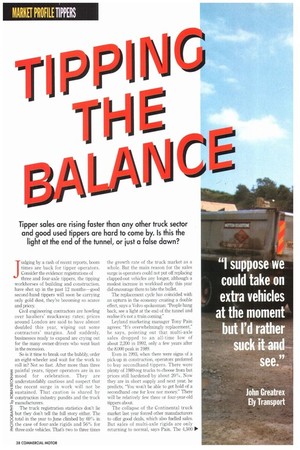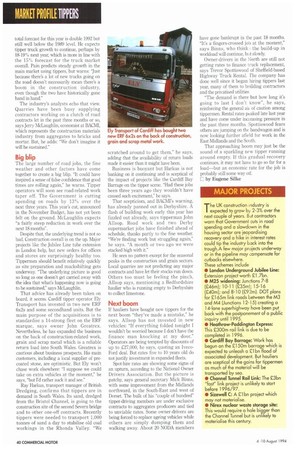- flP r
Page 40

Page 42

If you've noticed an error in this article please click here to report it so we can fix it.
THE
)A1)411■1C15
Tipper sales are rising faster than any other truck sector and good used tippers are hard to come by. Is this the light at the end of the tunnel, or just a false dawn?
judging by a rash of recent reports, boom times are back for tipper operators. Consider the evidence: registrations of three and four-axle tippers, the tipping workhorses of building and construction, have shot up in the past 12 months—good second-hand tippers will soon be carrying only gold dust, they're becoming so scarce and pricey
Civil engineering contractors are howling over hauliers' muckaway rates; prices around London are said to have almost doubled this year, wiping out some contractors' margins. And suddenly, businesses ready to expand are crying out for the many owner-drivers who went bust in the recession.
So is it time to break out the bubbly, order an eight-wheeler and wait for the work to roll in? Not so fast. After more than three i painful years, tipper operators are in no x mood for celebration. They are understandably cautious and suspect that ; the recent surge in work will not be .72 sustained. That caution is shared by 0
Ce construction industry pundits and the truck -cl,'" manufacturers. > E The truck registration statistics don't lie but they don't tell the full story either. The 8 total in the year to June climbed by 69% in 5 the case of four-axle rigids and 56% for E three-axle vehicles. That's two to three times
the growth rate of the truck market as a whole. But the main reason for the sales surge is operators could not put off replacing clapped-out vehicles any longer, although a modest inaease in workload early this year did encourage them to bite the bullet.
The replacement cycle has coincided with an upturn in the economy creating a double effect, says a Volvo spokesman: "People hang back, see a light at the end of the tunnel and realise it's not a train coming."
Leyland marketing manager Tony Pain agrees: "It's overwhelmingly replacement," he says, pointing out that multi-axle sales dropped to an all-time low of about 2,200 in 1992, only a few years after the 8,000 peak in 1989.
Even in 1993, when there were signs of a pick-up in construction, operators preferred to buy secondhand tippers. There were plenty of 1989-reg trucks to choose from but prices still hardened by about 20%. Now they are in short supply and next year, he predicts, "You won't be able to get hold of a secondhand one for love nor money." There will be relatively few three or four-year-old tippers about.
The collapse of the Continental truck market last year forced other manufacturers to offer good deals, which also fuelled sales. But sales of multi-axle rigids are only returning to normal, says Pain. The 4,500 ■
total forecast for this year is double 1992 but still well below the 1989 level. He expects tipper truck growth to continue, perhaps by 18-19% next year, which is more in line with the 15% forecast for the truck market overall. Pain predicts steady growth in the main market using tippers, but warns: "Just because there's a lot of new trucks going on the road doesn't necessarily mean there's a boom in the construction industry, even though the two have historically gone hand in hand."
The industry's analysts echo that view. Quarries have been busy supplying contractors working on a clutch of road contracts let in the past three months or so, says Jerry McLaughlin, economist at BAC1VII, which represents the construction materials industry from aggregates to bricks and mortar. But, he adds: "We don't imagine it will be sustained."
Big blip
The large number of road jobs, the fine weather and other factors have come together to create a big blip. "It could have inspired a sense of false confidence that good times are rolling again," he warns. Tipper operators will soon see road-related work taper off. The Government is cutting spending on roads by 13% over the next three years. This year's cut, announced in the November Budget, has not yet been felt on the ground. McLaughlin expects "a fairly steep reduction in work over the next 18 months".
Despite that, the underlying trend is not so bad. Construction overall is on the up. Major projects like the Jubilee Line tube extension in London help, but new orders for offices and stores are surprisingly healthy too. Tippermen should benefit relatively quickly as site preparation and muckshifting gets underway "The underlying picture is good so long as one doesn't get carried away with the idea that what's happening now is going to be sustained," says McLaughlin.
That advice has already been taken on board, it seems. Cardiff tipper operator Ely Transport has invested in two new ERF 6x2s and some secondhand units. But the main purpose of the acquisitions is to standardise a 14-strong fleet on the ERF marque. says owner John Greatrex. Nevertheless, he has expanded the business on the back of construction-related work, grain and scrap metal which is a reliable return load into South Wales. Greatrex is cautious about business prospects. His main customers, including a local supplier of precoated stone, are optimistic. But Ely won't chase work elsewhere: "I suppose we could take on extra vehicles at the moment," he says, "but I'd rather suck it and see."
Ray Harkus, transport manager of British Dredging, confirms that tippers are in demand in South Wales. Its sand, dredged from the Bristol Channel, is going to the construction site of the second Severn bridge and to other one-off contracts. Recently tippers were needed to transport 1,000 tonnes of sand a day to stabilise old coal workings in the Rhonda Valley. "We scratched around to get them," he says, adding that the availability of return loads made it easier than it might have been.
Business is buoyant but Harkus is not banking on it continuing and is sceptical of the impact of projects like the Cardiff Bay Barrage on the tipper scene. "Had these jobs been three years ago they wouldn't have caused such excitement," he says.
That scepticism, and BACMI's warning, has already panned out in Derbyshire. A flash of building work early this year has fizzled out already, says tipperman John Allsop. Road work and two Derby supermarket jobs have finished ahead of schedule, thanks partly to the fine weather. "We're finding work but struggling again," he says. "A month or two ago we were stacked high with it."
He sees no pattern except for the seasonal peaks in the construction and grain sectors. Local quarries are not predicting any major contracts and have let their stocks run down. Others too must be feeling the pinch, Allsop says, mentioning a Bedfordshire haulier who is running empty to Derbyshire to collect limestone.
Next boom
If hauliers have bought new tippers for the next boom "they've made a mistake," he says. Allsop has not invested in new vehicles: "If everything folded tonight I wouldn't be worried because 1 don't have the finance man knocking at my door." Operators are being tempted by discounts of up to .£27,000, he says, quoting an IvecoFord deal. But rates five to 10 years old do not justify investment in expanded fleets.
Spot-hire rates are showing some signs of an upturn, according to the National Owner Drivers Association. But the picture is patchy, says general secretary Mick Iiinns, with some improvement from the Midlands northward, in the South-East and west of Dorset. The bulk of his "couple of hundred" tipper-driving members are under exclusive contracts to aggregates producers and tied to unviable rates. Some owner-drivers are being forced to replace ageing vehicles while others are simply dumping them and walking away. About 20 NODA members have gone bankrupt in the past 18 months. "It's a fingers-crossed job at the moment," says Binns, who think ; the build-up in workload will continue, hilt slowly.
Owner-drivers in the North are still not getting rates to finance truck replacement, says Trevor Spottiswood of Sheffield-based Highway Truck Rental. The company has done well since it began hiring tippers last year, many of them to building contractors and the privatised utilities "The demand is there but how long it's going to last I don't know", he says, reinforcing the general an of caution among tippermen. Rental rates peaked late last year and have come under increasing pressure in the past three months. Spottiswood fears others are jumping on the bandwagon and is now looking further afield for work in the East Midlands and the South.
That approaching boom may just be the sound of a sparkling new tipper running around empty. If this gradual recovery continues, it may not have to go so far for a load—but an economic rate for the job is probably still some way off.
E by Eugene Silke






















































































